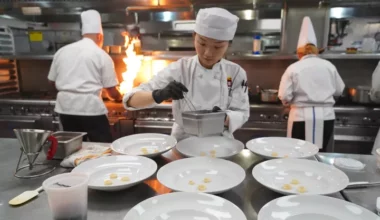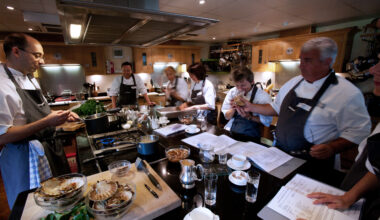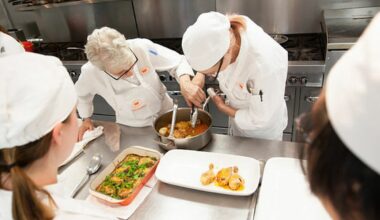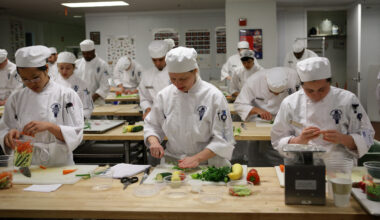In today’s culinary world, obtaining a formal education in food is crucial for aspiring chefs who desire to make a mark in the industry. Culinary schools offer a unique opportunity for individuals to hone their skills, gain valuable knowledge, and explore their passion for cooking.
China, known for its diverse and exquisite cuisine, presents an attractive destination for those eager to immerse themselves in the art of Chinese cooking. This article aims to provide a comprehensive guide to the admission process for culinary schools in China, shedding light on the requirements, procedures, and opportunities awaiting aspiring chefs.
Table of Contents
Choosing the Right Culinary School
Selecting the most suitable culinary school in China is a vital step towards achieving your culinary dreams. Consideration of various factors can help ensure a gratifying and enriching educational experience.
Factors to Consider
Location:
Urban centers like Beijing, Shanghai, and Guangzhou offer a vibrant culinary scene and abundant opportunities for culinary internships and networking.
Choosing a school located in a region famous for a specific cuisine, such as Sichuan or Cantonese, can provide specialized training in that style of cooking.
Specializations:
Investigate the specializations offered by different culinary schools, whether it be Chinese cuisine, pastry arts, or international culinary techniques.
Ensure that the school’s offerings align with your personal culinary interests and career goals.
Reputation:
Research the reputation of culinary schools, considering factors such as alumni success, industry partnerships, and faculty expertise.
Seek out reviews or testimonials from former students to gain insight into the quality of the education provided.
Importance of Research
Conducting thorough research is indispensable to make an informed decision about which culinary school in China to attend. Explore the school’s website, read student testimonials, and reach out to alumni to gain a comprehensive understanding of the institution’s strengths, faculty quality, and facilities.
Researching can help ensure that the culinary school you choose aligns with your personal goals and provides the best education and resources to set you up for success in the industry.
Budget and Scholarships
Consider your budgetary constraints and explore the financial aid options available to support your culinary education in China. Many culinary schools offer scholarships, grants, or tuition waivers based on merit and financial need.
Researching these opportunities can help alleviate the financial burden and enable you to focus on your studies and culinary growth without unnecessary stress.
Admission Requirements
Before embarking on the application process, it is essential to familiarize yourself with the admission requirements of culinary schools in China. While specific requirements may vary between institutions, certain criteria are commonly expected.
General Admission Criteria
Completed application form: Typically available on the culinary school’s website.
High school diploma or equivalent: Submitting proof of completing secondary education.
- Transcripts: Providing official academic records demonstrating previous achievements.
- Letters of Recommendation: Request letters from teachers or professionals who can vouch for your aptitude and passion for culinary arts.
- Personal Statement: Write a compelling statement outlining your motivations, goals, and commitment to pursuing a culinary education.
Language Proficiency
Proficiency in Chinese: As culinary programs are conducted in Chinese, a certain level of proficiency is required. Language proficiency tests such as HSK may be necessary, with specific score requirements varying between schools and programs.
Academic Qualifications
Depending on the program, specific course prerequisites or academic qualifications may be required. This may include a certain grade point average, coursework in relevant subjects, or prior culinary experience.
Letters of Recommendation
Submitting letters of recommendation from teachers or culinary professionals who can attest to your commitment, work ethic, and potential in the culinary field is a crucial part of the application process.
Personal Statement
Your personal statement is an opportunity to showcase your passion, dedication, and goals within the culinary arts. Highlighting your unique experiences and aspirations can set you apart from other applicants.
Application Process
Let’s dive into the application process proper
Online vs. Paper Applications
Most culinary schools in China offer online application platforms, allowing applicants to conveniently submit their materials and track the progress of their applications.
Some schools may still require paper applications, and it is vital to follow specific instructions provided by each institution.
Key Application Deadlines
Carefully review the application deadlines for your desired culinary schools in China. Missing deadlines can significantly impact your chances of admission.
Consider applying early to increase your odds of securing a spot in competitive programs.
Application Fees
Many culinary schools charge application fees, which must be paid during the application submission process. Be sure to allocate funds for these fees when budgeting for your culinary education.
Required Documents Checklist
- Transcripts: Request official copies of your high school or previous academic transcripts to be sent directly to the culinary schools you are applying to.
- Passport: Ensure your passport is up to date and valid for the duration of your stay in China.
- Health Certificates: Check if the culinary school requires any specific health certificates or medical documentation. This may include physical examinations, immunization records, or other health-related documents.
Entrance Exams
To assess applicants’ aptitude and readiness for culinary education, many culinary schools in China require entrance exams. Understanding the types of exams and how to prepare for them can enhance your chances of success.
Types of Entrance Exams
- Language Proficiency Tests: Chinese language proficiency may be evaluated through standardized tests like HSK (Hanyu Shuiping Kaoshi). Different schools may require specific HSK levels for admission.
- Practical Cooking Tests: Some culinary schools may conduct practical exams to assess applicants’ basic culinary skills and techniques. These tests may involve ingredient identification, knife skills, or food preparation tasks.
Preparation Tips
- Language Proficiency: Consider enrolling in Chinese language courses or using online resources to improve your proficiency for the language proficiency exams.
- Practical Cooking Tests: Brush up on fundamental culinary skills, such as knife techniques, cooking methods, and food plating. Practice your skills in a well-equipped kitchen to build confidence.
Scoring and Cut-Offs
Each culinary school may have its own scoring system and cut-off points for entrance exams. Familiarize yourself with the specific requirements of your chosen school to understand the benchmark you need to achieve.
Interview Process
Interviews are a common component of the admission process for culinary schools in China. They provide an opportunity for schools to assess applicants’ interpersonal skills, communication abilities, and passion for the culinary arts.
Purpose of Interviews
Interviews allow the culinary schools to evaluate an applicant’s suitability for the program, as well as their potential for success in the culinary industry.
Common Interview Questions
Be prepared to answer questions regarding your motivations for pursuing culinary education, previous culinary experience or training, long-term career goals, and how you plan to contribute to the culinary industry.
Dress Code and Etiquette
Dress professionally for your interview, presenting yourself in a manner that reflects your seriousness and respect for the interview process.
Polite and attentive behavior, active listening, and clear communication are essential during interviews.
Preparing for Interviews
Practice answering common interview questions, preferably with a mentor or someone experienced in the culinary industry.
Research the school’s culinary programs, faculty, and achievements to showcase your knowledge and dedication during the interview.
Visa Application
After receiving an admission offer from a culinary school in China, the next step is to apply for a student visa. Familiarize yourself with the visa application process and the required documentation.
- Types of Student Visas: Most international students studying culinary arts in China will require an X1 or X2 student visa. The specific visa type will depend on the duration and nature of the program.
- Visa Application Process: Contact the Chinese embassy or consulate in your home country to obtain detailed information about the visa application process, including required forms, fees, and submission procedures.
- Required Documentation: The documentation necessary for a student visa application typically includes a valid passport, visa application form, admission letter from the culinary school, financial proof, and other supporting documents as specified by the embassy or consulate.
- Visa Interview: Depending on the embassy or consulate’s requirements, you may need to attend a visa interview. Prepare for the interview by familiarizing yourself with your program details, the reason for choosing China, and your plans after graduation.
Financial Planning
Managing finances during your culinary education is crucial for a smooth and stress-free experience. Consider the various financial aspects associated with studying in China.
Tuition Fees
Research and understand the tuition fees for the culinary program you are pursuing. Take into account any additional fees for supplies, uniforms, or administrative costs.
Living Expenses
Factor in your living expenses, such as accommodation, food, transportation, and personal expenses, when planning your budget. Costs may vary depending on the location of your culinary school and your personal lifestyle choices.
Scholarships and Financial Aid
Explore scholarships, grants, and other financial aid options offered by the culinary school, government programs, or external organizations. Applying for financial assistance can ease the financial burden of your culinary education.
Part-Time Work Opportunities
Check if there are part-time work opportunities available for international students in China. Some culinary institutions may offer on-campus jobs or connect students with potential employers in the hospitality industry.
Housing Options
Ensuring suitable accommodation is essential to make the most of your culinary school experience in China. Evaluate the available housing options to find the best fit for your needs.
- On-Campus Accommodation: Many culinary schools in China provide on-campus accommodation options for students. Living on campus offers convenience and the opportunity to immerse yourself in a vibrant culinary community.
- Off-Campus Housing: Off-campus housing options, such as renting an apartment, may provide more independence and flexibility. Consider factors like distance to the culinary school, safety, and cost when exploring off-campus housing.
- Tips for Finding Suitable Housing: Research local real estate agencies, online platforms, and student communities for information and advice on finding suitable housing options. Consider consulting with the culinary school’s international student office for guidance and recommendations regarding reliable housing sources.
Preparing for Arrival
Proper preparation before your departure for China is important to ensure a smooth transition to your culinary school and host country.
- Packing Essentials: Pack clothing suitable for different seasons and weather conditions in China. Consider bringing essential cooking utensils, ingredients, and kitchen tools that may not be readily available or are specific to your culinary interests.
- Cultural Orientation: Familiarize yourself with Chinese culture, customs, and social norms. A basic understanding of Chinese traditions and etiquette will help you navigate daily life more effectively.
- Language Courses: If you have not already, consider enrolling in Chinese language courses to improve your language skills, making it easier to communicate and adapt to your new culinary environment.
The First Days in China
Upon arrival in China, the initial days at your culinary school mark the beginning of an exciting chapter in your culinary journey.
- Arrival at the Culinary School: Familiarize yourself with the campus, facilities, and resources available to culinary students. Seek guidance from faculty or staff members to orient yourself and understand the culinary school’s expectations and rules.
- Registration and Orientation: Attend the registration and orientation sessions organized by the culinary school. These events provide valuable information about academic processes, resources, student support services, and campus life.
- Exploring the Campus and Local Area: Take the time to explore the culinary school campus and the surrounding local area. Familiarize yourself with nearby food markets, restaurants, and cultural landmarks. Immersing yourself in the local environment will enhance your overall culinary experience in China.
Academic Life
Embracing academic life is key to maximizing your learning potential and making the most of your culinary education in China.
- Curriculum Overview: Review the curriculum and course requirements for your chosen culinary program. Familiarize yourself with the learning objectives, specific courses, and the sequence of classes you will be taking.
- Class Schedules: Pay close attention to your class schedules to ensure you are aware of the timing, location, and duration of your culinary classes. Planning your time effectively will help you balance academic commitments and personal activities.
- Extracurricular Activities: Participate in culinary-related extracurricular activities such as cooking competitions, food festivals, culinary clubs, or volunteering opportunities. These activities will enhance your culinary skills, expand your network, and provide a well-rounded culinary education experience.
Frequently Asked Questions (FAQs)
What are the general admission requirements for culinary schools in China?
Culinary schools in China typically require a high school diploma or equivalent educational qualification.
Proficiency in Mandarin Chinese may be necessary, as some culinary programs are predominantly taught in Chinese.
Depending on the school, applicants may need to demonstrate their culinary passion and skills through auditions or portfolio submissions.
Are there age restrictions for admission to culinary schools in China?
While most culinary schools do not have specific age restrictions, it is essential to check individual school policies, as certain programs may have different requirements based on age and work experience.
Can international students apply to culinary schools in China?
Yes, international students can apply to culinary schools in China. They will need to apply for a student visa (X visa) to legally study in the country. Check out our article on how to apply for culinary schools in China as an international student.
What documents are required for a student visa application?
Generally, applicants will need to provide an admission letter from the culinary school, a completed visa application form, a valid passport, proof of financial capability to cover tuition and living expenses, and a health certificate.
What support services are available for international students adjusting to life in China?
Most culinary schools in China provide support services to help international students adapt to their new environment. These may include orientation programs, language assistance, cultural activities, and accommodation arrangements.
How can international students overcome language barriers in daily life?
While a basic understanding of Mandarin Chinese is beneficial, many culinary schools have English-speaking staff and offer language courses for international students. Embracing immersion and practicing language skills with local residents can also aid in overcoming language barriers.
What career opportunities are available for culinary graduates in China?
Culinary graduates in China can find a plethora of career opportunities. They may work in high-end restaurants, hotels, resorts, cruise ships, catering companies, or even establish their own culinary ventures. Additionally, graduates can explore opportunities in food media, such as culinary writing, television, or digital platforms.
Are there opportunities for international job placements?
Yes, some culinary schools in China have collaborations with international establishments, providing graduates with the opportunity to work abroad. These partnerships offer valuable cross-cultural experiences and an avenue for graduates to showcase their culinary skills on a global scale.




